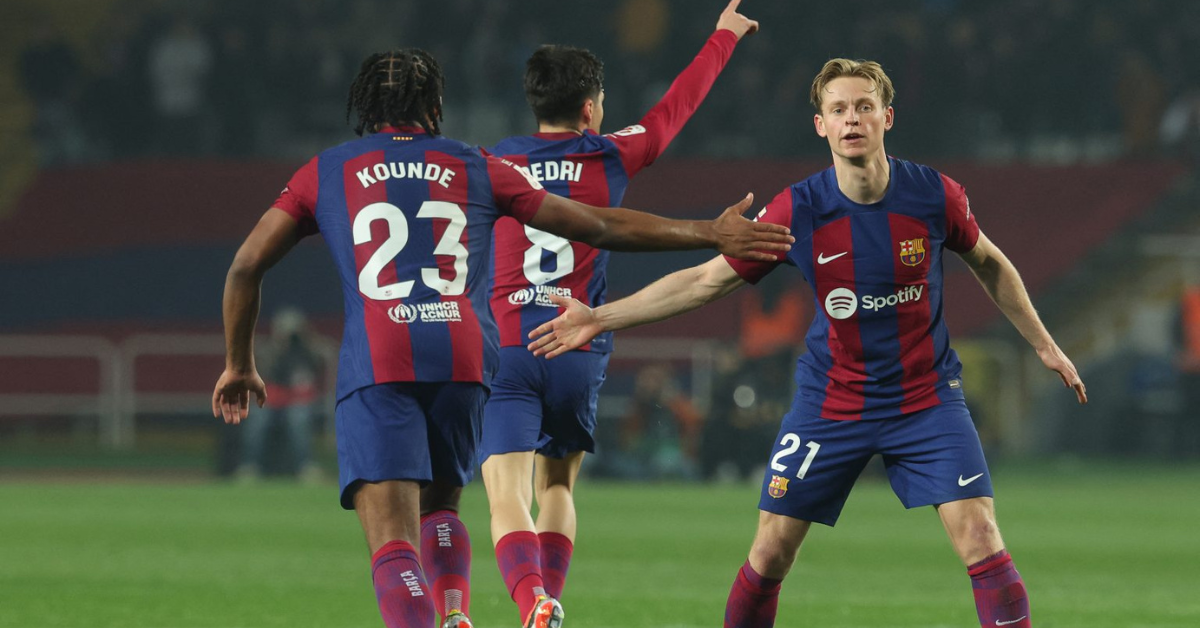Barcelona duo not willing to leave club due to their high salary

As the summer transfer window approaches, FC Barcelona finds itself grappling with the challenging task of offloading players to alleviate financial burdens and comply with La Liga's 1:1 rule. However, the road to restructuring the squad is riddled with obstacles, particularly concerning high-earning players like Frenkie de Jong and Jules Kounde.
Financial Imperatives and Player Sales
Barcelona's financial woes have been well-documented, with the club seeking to balance its books and adhere to strict salary caps enforced by La Liga. The departure of players on loan, including the likes of Clement Lenglet, Ansu Fati, Sergino Dest, and Eric Garcia, represents a first step towards restructuring the squad. Yet, these players are not anticipated to generate significant revenue upon their exits.
The crux of Barcelona's dilemma lies in the challenge of offloading players with substantial transfer value while retaining essential assets integral to the team's future. Promising talents such as Pedri, Gavi, Ronald Araujo, and Lamine Yamal are deemed non-negotiable, further limiting the pool of players available for potential sales.
High-Earning Players and Wage Constraints
A recent report by SPORT has shed light on the hurdles Barcelona faces in negotiating the departures of Frenkie de Jong and Jules Kounde, primarily due to their exorbitant wage demands. Both players command substantial salaries, making it difficult for them to secure moves elsewhere without significant salary compromises.
Frenkie de Jong, in particular, stands out as one of Europe's highest-paid players, reportedly earning a staggering €40 million gross annually. His contract includes an escalating wage structure, projecting even higher earnings in the upcoming season. Barcelona is open to entertaining offers upwards of €70 million for the Dutch midfielder, especially if he opts against renegotiating his contract.
Transfer Interest and Challenges
Despite interest from Premier League clubs and Bayern Munich, a potential deal for Frenkie de Jong remains elusive primarily due to wage disparities. While clubs are keen on acquiring his services, bridging the gap between his current salary and prospective offers poses a significant challenge.
Xavi Hernandez, Barcelona's manager, has expressed a desire to retain Frenkie de Jong within the squad, underscoring the midfielder's importance to the team's future plans. However, the financial constraints imposed by La Liga necessitate tough decisions regarding player sales and wage restructuring.
Path Forward: Balancing Financial Prudence with Squad Stability
Barcelona's predicament underscores the delicate balance between financial prudence and squad stability. While player sales are imperative to alleviate financial burdens, the club must navigate the intricacies of high-wage contracts and player values.
The upcoming summer transfer window promises to be a pivotal period for Barcelona, defined by strategic decisions aimed at reshaping the squad while adhering to stringent financial regulations. The resolution of the Frenkie de Jong saga will serve as a litmus test of Barcelona's ability to navigate the complexities of modern football economics.
As Barcelona charts its course for the future, the club's ability to strike a balance between fiscal responsibility and on-field competitiveness will shape its trajectory in the evolving landscape of European football. The saga surrounding Frenkie de Jong epitomizes the challenges faced by modern football clubs in managing player assets amidst financial constraints, underscoring the inherent complexities of the transfer market.
In conclusion, Barcelona's pursuit of financial stability hinges on its capacity to navigate the intricacies of player sales and wage negotiations in the upcoming transfer window. The club's ability to secure suitable deals for high-earning players like Frenkie de Jong will be instrumental in reshaping the squad and ushering in a new era of competitiveness.
